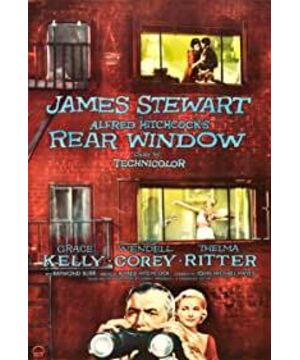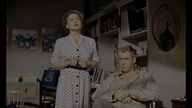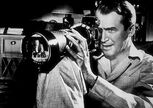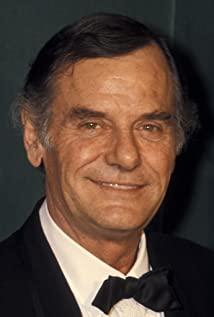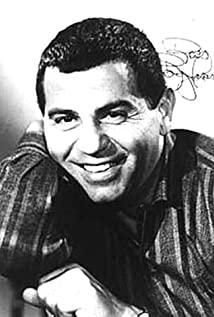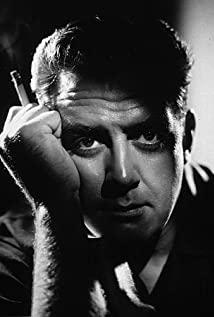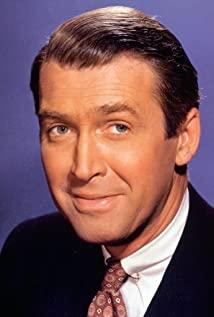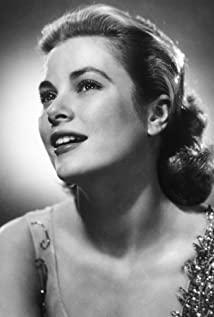This "Rear Window" is the highest-ranked Hitchcock movie in IMDB (ranking 13), and it should be regarded as the most watched and liked popular film. For it, the most people associate it with "voyeurism." I remember that a film teacher once said: "If you see a movie about murder, level one; what you see is a film about voyeurism, level two; you see a film about love; At level three, what you see is a movie from disorder to order, which is the highest level.” Indeed, Hitchcock’s success lies not only in the stories he tells, but also in the way he tells stories. . From the conflicts and entanglements at the beginning to the calm and orderly ending, he talked about the suspense of a murder film bit by bit, and all of this only happened within a range of 100 meters radiating from the window of a room. , And the protagonist’s range of activities is almost statically leaning against the window, which is a test of a storytelling ability and shooting skills.
When watching this movie, I thought of several interesting questions:
1. Hitchcock's morality on "voyeurism"
If this is a movie about "voyeurism," the great Hitchcock saw it thoroughly. Peeping out is a kind of psychological instinct that everyone has. Freud believed that voyeurism satisfies the needs of the subconscious mind. People get sexual satisfaction through this. This involves Freud's "panness theory", so this kind of sex does not refer to the simple reproductive function of sex. (There are many examples of this in the movie. The most famous one is the short TV film of "Love Story" by Kieslowski and its adaptation of the movie, which is also my favorite.) Hitchcock is a favorite. A director who has a deep influence on Freud's psychology. Many of his films attempt to analyze the reasons for the characters and plots of the movie through Freudian psychology analysis (especially the analysis of dreams). When the undergraduate psychology class talks about Freudian psychology, it uses "Doctor Edward" as an example to analyze. So in this movie, Hitchcock also used his carefully arranged and cleverly set lens to express such a philosophy. He arranged for the protagonist to spy on the good scenes played in the windows of the opposite building, and spend his days by spying on other people's lives. Let us see that no one can escape the temptation of peeping and the embarrassment of being peeped, so we have a very thorough analysis of human nature. When the protagonist accidentally discovers a murder case while voyeurizing, the immoral behavior of voyeurism seems to be less immoral here. In a country in the United States where everyone claims to have privacy, voyeurism seems to be an immoral thing compared to murder, but here, voyeurism has become a kind of morality that opposes immorality. So, what I want to ask is where is the boundary between the two? As early as in ancient Greece, Aristotle had already begun to discuss this issue in his ethics. "The main thing of virtue is to avoid evil." Therefore, morality is connected with good, but it is not completely equivalent to good. So what is moral and what is immoral? The scope of application of the term "immoral" is very narrow. For example, we know that weak will is not immoral, so is it immoral for young and strong people to beg? There are many examples of this in life. Is suicide unethical? Many people will argue. Regarding this issue, there may be an explanation that peeping is essentially judged as an immoral behavior, but since the crime it brings is far less than a murder, it is not such an immoral behavior. The boundary between morality and immorality is always an interesting and controversial topic in ethics. In Hitchcock's movies, morality has always been the object of his play.
2. Regarding the cinematic semiotics of "voyeurism"
I think that Hitchcock's superiority in this film also lies in its insight into the essence of the film. Regarding the essence of film, the second film semiotics is very thorough. Christian Matz said that on the one hand, the movie satisfies the desire of people to peep, and on the other hand, the movie also satisfies the desire of people's dreams. We can also use the following very simple theoretical framework to deconstruct the viewing process: active/passive, subject/object, and seeing/being watched. (Of course, in the eyes of deconstructionists, any dichotomy is a trap) This set of film theory is deeply influenced by Lacan's structuralist psychoanalytic theory, and Lacan is a disciple who inherited Freud's mantle. Metz said that on the one hand, the movie is an exhibitionist, and the viewer is a voyeur. The desires of the two are trapped in a permanent exchange of two purposes, namely, active/passive, subject/object, and watching/being watched. . On the other hand, the movie is not an exhibitionist. I am watching it, but it does not see that I am watching it, or it knows that I am watching it, but it does not want to know the fact. "It is this fundamental denial that introduces all classical movies into the story. It ruthlessly erases the inference basis of the story, and at best turns the story into a beautiful closed object." Therefore, the movie is the one who knows and the one who doesn't know at the same time, but the two are inseparable. When a movie is a film, it is a knower, it appears in every film, in the form of discourse behind the fiction; when a movie is a film (story) in this article, it is a person who does not want to know. Therefore, when the film is shown, the audience is present and aware of the actor, but the actor is not present and does not know the audience. During the filming, the actors were present and the audience was absent. Therefore, the film tries to make itself into a character who is both exhibitionist and covert in such a way.
In this sense, Hitchcock's "Rear Window" is also a movie about movies. Discussed in layers: First, we saw a movie of male and female protagonists on the screen. Secondly, the male protagonist sees through peeping that every neighbor's house on the opposite building is a movie. In the end, the murder movie of a merchant family affects the development of the whole story. In this way, the movie in the movie satisfies our desire to watch a movie. In order to tell this story, Hitchcock made a rather long and detailed preparation at the beginning. What's interesting is that Hitchcock used the way of simulating the perspective of the male host princess to push and zoom in to shoot the neighbors' movies. Each window can be regarded as a play. The neighbor is enlarged to the center of the screen, and it will zoom in and out as the peeper rises and lowers the telescope. The audience is the hero, and it also alludes to those of us who watch movies. Therefore, in this movie, half of the story is about the life scenes of the neighbors. What I marveled at was Hitchcock’s imagination and creativity. For example, for the shooting of the neighbor’s house on the opposite side, he almost used documentary methods without voice-overs. I could vaguely hear the topics the neighbors were talking about. It was more through their actions and Use facial expressions to imagine what happened. The heel from one window to another is a kind of internal montage. We can guess, but at the same time, this kind of guessing is also accompanied by the reasoning of the male host at the time. Therefore, the mood of the audience is easily taken away by the movie. This is the magical part of Hitchcock. Starting from Eisenstein, the nature of film montage has been highlighted. Hitchcock's montage set here is amazing. Speaking of Hitchcock's contribution to film shooting techniques, there are a lot of writings in the history of film.
3. About watching old movies
This movie is an old movie from 1954, and it is also a classic movie. Every time I watch an old movie, I always feel that I am not watching a movie, but watching how to make a movie, and I feel a little tired. Almost all old movies are textbooks. I remember that in the undergraduate class of film history, the teacher explained to us classic film textbooks such as "General Patton", "Graduate", and "Citizen Kane" almost one by one. For example, how the 10-minute speech at the beginning of "General Patton" was filmed, such as when Orson Wells photographed the fourth wall in "Citizen Kane", such as the underwater subjectivity in "The Graduate" How the lens was taken and so on. I went to the Antonioni Film Festival, but it hurt me. It was a headache for me to watch a rather experimental movie like "Zabriski Cape". Such a habit makes watching movies no longer a pure sensory pleasure, but a learning task, which is quite distressing. Movies are very interesting, and I once thought about it this way: if I understand the doorway, how much fun should I lose? If I can clearly judge why this lens is set up and what is the role of this dialogue, then how much blank space do I leave for myself to experience the joys, sorrows, sorrows and joys that this movie will bring to me? So at the beginning, I resisted accepting all enlightenment, just to keep the empty space in my heart. But I gradually realized that if I actually don't know movies but think I do, then I still lose a lot of fun. What is a movie? Have you thought about this problem? Whose dream is the movie? Whose works? There are so many people to thank for the success of a movie, but where is their sweat? Have you seen it? So now I watch movies more sensibly. Some films are used for pleasure, such as Zhang Yimou’s historical blockbusters, which are for entertainment only; and some films are used for learning. For the ideological nature of the film, there are various European films, and for the innovation of the film form, there is Brueair. , Antonioni, Truffau, Hollywood, etc.
So about Hitchcock's movies, he made a lot of contributions, and later generations almost learned him all. I don’t mention anything else, just take the beginning of "Yunshuiyao" not long ago, which copied the large panorama of the slow-shaking camera at the beginning of "Rear Window".
In the history of film, the younger generation pays tribute to the predecessor generally in several forms:
There are two very straightforward filmmakers. One is to insert a film of a certain director he likes directly in his own movie, or it is related to the theme, and even more is the kind that has nothing to do with the theme, and the purpose is only to express him. Tribute. What impressed me the most was the persistent and cute "Elvis" who wanted to be a film actor in "Arizona Dream" by Kusturica. He always imitated Hitchcock on various occasions. The 7-minute flight chasing people in "North by Northwest" performed seriously and ridiculously. Another kind of straightforward person will remake a certain classic movie again. This requires a lot of courage, because the classics have always been canonized. It is difficult to surpass, otherwise they will only ask for trouble.
The other two kinds of people are not so straightforward. Some slightly "smart" people will hide this kind of worship, but quietly apply a certain shooting scene or shooting method of the predecessor to their own movies. . This is generally called plagiarism. But it is more difficult to recognize, which requires those fans who have read countless movies, have amazing memory, and have brilliant eyes. The other kind of talent is really smart, and he is the kind of filmmaker who truly integrates the former's things into his own work to form his own style. For example, we all know that Hou Xiaoxian said that he was deeply influenced by Truffau and Ozu Yasujiro, but we can’t see the shadow of the two in his movies. Hou Xiaoxian can turn this influence into his own style. Just become a master.
Okay, too much writing, back to Hitchcock. Truffaut said that Hitchcock’s suspense movies are also good-looking love movies, and his love movies are also good-looking suspense movies. Therefore, this film is also a pretty good-looking love movie. This is not the subject I want to talk about, so I won't repeat it. Regarding his films, whether you like them or not, his films are able to take into account business and art and have their own style, that is, they can create a bunch of topics that will never be discussed, so he can call him a master.
There are two books that Greek fans must have: One is Truffau’s "A Dialogue between Hitchcock and Truffau". As an advocate of "Author Films", Truffau is also a director. He is Admire Hitchcock in this manner and raise him to a very high level; the other is "If you dare not ask Hitchcock, just ask Lacan" edited by Zizek, a student of Lacan . You Ximi said that when you open this book, all articles are written by scholars of sociology and philosophy who have nothing to do with movies. They are to set an example for those "PhDs in film" and let them learn. Learn how to write high-end film theory articles. This book is not only of little use to people who practice filmmaking, but also of use to those who use movies as entertainment. However, this book reminds us once again: Even the most profound research must be based on the analysis of the film text, and the close reading method will never be outdated. Therefore, looking at the alternative explanations of the authentic academic school is also a piece of ideological entertainment, why not do it?
View more about Rear Window reviews


